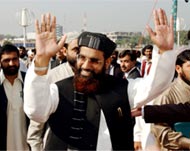Mourners vow to avenge Pakistani MP
Hundreds of emotionally charged mourners have rampaged through the Pakistani capital, following funeral prayers for member of Parliament, Azam Tariq who was gunned down on Monday.

Police gave chase to the angry mobs after they pelted cars with rocks, torched a cinema in the Melody market and set ablaze a Shia mosque in the Aabpara neighbourhood.
An employee of the Melody cinema, identified as Ghafoor, was killed. He was sleeping inside when mobs set the cinema on fire. “He was brought to the hospital dead,” said Dr Rashid Qurashi.
Another six people were being treated at the Polyclinic hospital for burns, smoke inhalation and cuts sustained when they tried to flee the blazing cinema.
Smoke was billowing from a petrol station where crowds had set fire to jerry cans full of petrol, an AFP reporter at the scene said.
At least a dozen vehicles were damaged near the cinema.
“We will revenge your martyrdom, we will revenge your killing,” mourners chanted earlier at the funeral prayers.
Sunni leader Maulana Abd al-Hafeez Hazari led the funeral prayers, which were followed by fiery speeches from fellow clerics close to Tariq.
“Those who are behind this killing will not be spared,” Maulana Masud al-Rahman Osmani told the crowd. Other speakers appealed for calm.
Tariq, the leader of the Sunni Sipah-e-Sahaba organisation, was killed after occupants of an unmarked vehicle opened fire on the car Tariq was travelling in.
Tariq, his driver and three bodyguards were killed. No one has yet claimed responsibility for the killing.
 |
|
Tariq was the leader of the Sunni |
Spate of killings
The killing comes after a spate of sectarian violence in Pakistan, culminating in the worst attack in years in July when suspected members of a sectarian Sunni group killed at least 57 Shia worshippers in an attack on a mosque, in the southwestern city of Quetta.
On Friday, six Shia Muslims were gunned down while on their way to the mosque for Friday prayers. Two or three gunmen on a motorcycle opened fire on the bus carrying the six. Five were killed on the spot and the sixth died in hospital.
Groupings banned
Tariq’s group was one of seven groups outlawed by President Pervez Musharraf in a crackdown on religious violence in the area.
Sipah-e-Sahaba has been accused of involvement in a wave of violence between Pakistan’s dominant Sunni Muslims and the smaller Shia community, who account for about 15% of the 149 million population.
But like other outfits, Sipah-e-Sahaba now officially works under a new name and its leader, Tariq, was allowed to contest successfully a parliamentary election in October 2002.
In an interview in February, Tariq told Reuters he had been unfairly branded a terrorist by the Western media. Tariq was born in Punjab in 1962 and went on to study at a religious seminaries in Faisalabad and Karachi, before setting up SSP in 1986.
In 1997, Tariq was injured in a remote-controlled bomb attack in the city of Lahore in which 23 people, including an SSP leader, were killed. The attack was blamed on Shias.